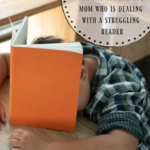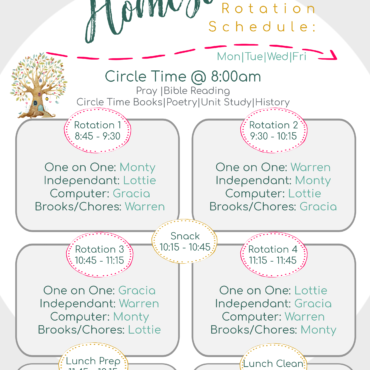It definitely hasn’t gone as I imagined it would!
When I started pondering the idea of homeschooling my kids several years ago, I can recall daydreaming of the amazing field trips we would take, the huge stacks of books we would devour, and all of the extra time we would have to follow our interests. I poured over blogs, researching what type of education I thought would suit our learning style best. My plan was to fly through one of the the best phonics based reading programs that promised consistent results before we moved on to the more enjoyable learning and activities. After all, homeschoolers should be able to read earlier than their peers, right?!? Wrong. For my son, it was complete opposite and just wasn’t clicking like I had expected it would. So we ditched the first colourful curriculum and moved on to another popular suggestion. Surely the first curriculum choice was the issue. Nope! Tears! Confusion! Blank Stares! We tried to slow it down with yet another new curriculum. Still nothing. Spent more money. Nothing! More time at the table. Flashcards. Reading before bed. Computer programs. Bribing. Books of interest. Nothing. We worked on it year after year with nothing more then small drops of improvement. Definitely nothing where I could genuinely say to my peers or extended family members, “Hey, my child can read!”
It was hard, lonely and frankly kind of embarrassing. We had made the choice for our family to keep our kids at home but then then failed to succeed at what should be one of the first, most simple tasks! Reading!
Has anyone else been there? Anyone?
No one really questions “schooled” children the way they question children who are being taught in the home. And when it is your first “protege”, it is SO easy to jump into that bandwagon and actually believe that the problem lies directly on you, or that you are failing your child!
Rather than throw in the towel and run, I decided to pour into research and talk with others who have more experience in this area than I did. I immediately learned that what I was experiencing was not my fault, and how common it is for SO many kids, regardless of their learning environment, to take much longer to catch on to reading than their peers. I was also encouraged by several teachers I spoke with that no school educator or tutor would be able to provide the amount of time and dedication that I was able to give at home and that with the right tools and a lot of extra patience, I was more than capable to take on this task. I decided to press on and focus on my individual child, his needs, his personality and his environment and work at his pace. I poured through literature, books and blogs of educators and parents to find the best solutions I could for a struggling reader.
Among all of the amazing advice and many trial and error lessons, I have found a few suggestions that I have stuck with religiously and used on all of my kids. Not only did my first son struggle, but so did his younger brother; it just didn’t bother me like it did with my first and I felt more equipped having the right tools, patience, and the wisdom to slow down and take it as his pace. My younger 2 girls seem to be catching on much quicker and I don’t think it would matter what curriculum we used for them as they are generally more interested and it simply seems to click for them. I am SO thankful for the helpful guidance I received and have enjoyed using the advice for not only my kids, but myself too!
Tips for Parents of Struggling Readers
- Remove ALL the frustration! Immediately. Your kids can sense your feelings towards them and it is not at all necessary and will in fact slow the entire process down. Relax! Let your child know you are on their team working with them, not against them.
- Do not in any way stop reading to your kids. In fact, spend at least triple the time more reading to them than having them read to you. You want to continue their love for books by filling their minds with good stories and good experiences.
- Find small moments in the day to have your child read words or sentences that you know 100% they will not struggle with at all. And when they do, compliment them, celebrate with them, and then go about your day.
- Don’t beat yourself up and don’t let others belittle you by making it feel like you are the problem.
- Seek out advice, learn from others, and don’t be scared to ask for help. Be an advocate for your child.
Tips to Help your Struggling Reader
- Do not underestimate the power of audiobooks. When your kids are constantly immersed in quality books, they will have more of a reason to want to press forward with their own reading development. In our house, we have a monthly account with audible.ca (or audible.com depending on your location) and our kids have access to our collection daily which has resulted in them listening to most of these books over and over again. Not a day or night goes by without our audible account being put to use.
- Let them read the same books over and over again. This helps with processing sight words quickly and allows them to slowly transition from just sounding out the letters, to actually being able to comprehend what they are reading. When they are constantly being told to read a new book every time they sit down with you, it is hard for them to feel like they are making progress.
- Use copywork from their favourite books to help with their spelling. Rather than have them work on monotonous spelling lists and tests, take words, phrases, or passages from their favourite books, type them up in a larger font, and have them use those selections for their copywork. Once they have written out the selection of text several times, try oral dictation or french dictation. For a great post that digs deeper into dictation, I recommend this one from Brave Writer!
- Follow their interests, and use that as a guide to reading and writing activities. My 8 year old son is WWII enthusiast and especially loves anything to do with submarines. Not only do we look for war books to read, but we use activities like labelling a submarine or war ship, capturing war facts to re-write in our history books or just using a great historic picture book book for his copywork.
- Read books together. My kids love it when we take books and take turns reading sentences or pages from the book. They don’t feel quite so overwhelmed about getting through the entire book alone and they are able to enjoy the storyline easier since half of the book is being read to them.
- When starting out, look for books that have large print, spaced out words, and pictures that help with the text. Although my girls are not overly confused by different sizes and kind of texts, my boys both really struggled when the text was not large enough or written close together.
- Have them read stories that they wrote! Have your kids dictate a story to you. You write it out initially for them. If they are ready, they can copy it out in their own book. If not, just write it out yourself in a small notebook. Have your kids illustrate the pictures and then let that be one of the books they can choose for reading. They love that!
- Associate reading practice with comfort and treats. Make it a cozy time. Read on the couch, read in bed, make cinnamon buns or hot chocolate. Reading should be something that they look back at with fond memories. That is one of the many perks of homeschooling! School can be done anywhere and you don not need to wait until break time to have a snack.
- Wait for the right mindset in your child before you start. Don’t wait until they are overtired or hungry. Have they had a bad day? Take the time to visit with them first about their day or something that interests them. Encourage them in non reading related things to build up their love tank. Get them smiling and mentally on track and your chance of succeeding will be greatly increased.
- Do a mindset check on yourself before beginning. Are you frustrated? Are you rushing through this time with them? Is supper about to spill over? Is your phone sitting next to you while you are waiting for an important text? Kids notice these things and easily get distracted and unmotivated. Put it all away and find some special time that is just for the two of you.
- Use an online program as an extra tool. In our home, we love Reading Eggs. All of our kids have used it and had great success with it. They send you progress reports, track their development, and even give out certificates for achievements. It is good for up to age 13 although we we have primarily used it up until about age 8.
What about the Curriculum?
I am not convinced that there is a quick fix curriculum solution, (especially for struggling readers). Curriculums can be an amazing tool but you need to know when to pull the brakes, especially if what you have chosen is causing more tension between you and the child than it is providing success. We love to start out with “Teach Your Child to Read in 100 Easy Lessons” and then move on to short readers, library books, and focus heavy on copywork and dictation as mentioned above. We have had more success with that than any program we have ever used. The year we finally ditched our reading curriculum and focused rather on copywork and dictation from quality literature was the year that saw a massive improvement in his spelling, reading, and writing skills. We now also use the Brave Writer Arrow program for our 8 and 10 year old which suits our learning style perfectly and has changed the entire structure and flow of our school days!
These are my favourite tips that have worked well for our family! What have you had success with for your struggling readers?









Add Comment